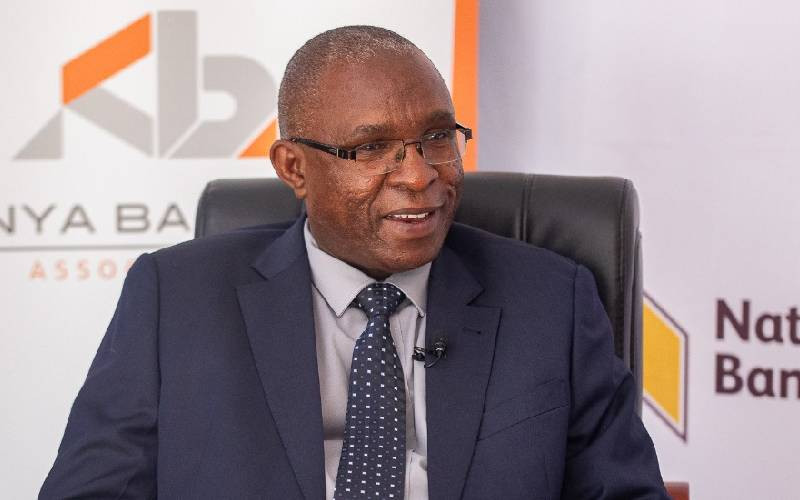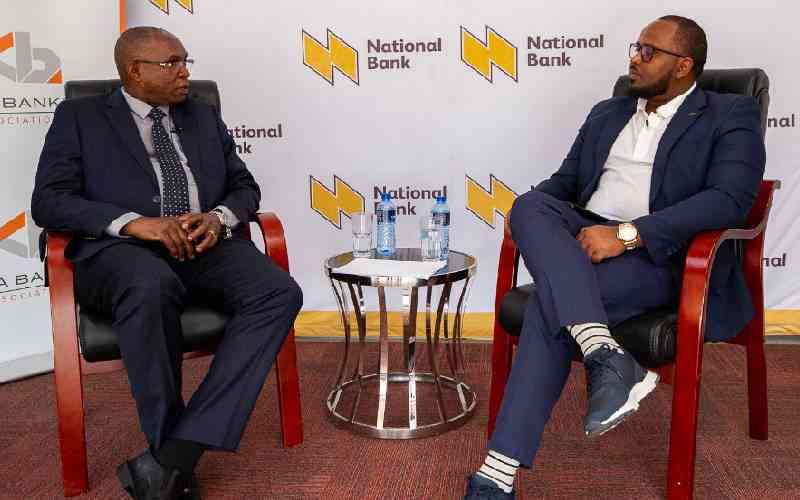
National Bank of Kenya Managing Director George Odhiambo has raised concerns over weak governance, poor data systems and outdated perceptions about lending.
He noted that these remain the biggest obstacles preventing Kenyan SMEs from accessing affordable credit, even as banks modernise their assessment models.
Speaking during the ‘My Chat with a Bank CEO’ forum, Odhiambo said many SMEs struggle to move from founder-led operations to structured enterprises with proper boards and independent oversight.
“Many of them go to stability after 10 or 20 years. So when you tell them you need to change your governance, have a board, have independent directors, they find it uncomfortable to go to the next level. That is the meaning of awareness,” he said.
He noted that bank assessment models have shifted significantly over the past two decades. In the early 2000s, location defined creditworthiness, an approach he says is now obsolete.
“You could be stationed in Nakuru but deliver to someone in Naivasha or Limuru. The market space is no longer a barrier to assessment,” he said, explaining that online commerce has made many SMEs nationwide players regardless of where they operate.
While SMEs often complain that banks still demand collateral, Odhiambo insisted the real challenge is data quality, not assets.
“Lending is about trust. If you miss accommodating mobile payments in your assessment, you miss who the SMEs actually are,” said Odhiambo
He urged entrepreneurs to consolidate their business activity, including mobile receipts, into a primary account to build a reliable financial history.
Risk-based lending, now being rolled out across the industry, will rely heavily on such data.
“If you don’t have the right data, even the good borrower might be lost in the wrong borrowing bracket,” he added.
Odhiambo said government-backed credit guarantee schemes can reduce risk, but awareness gaps persist and misconceptions sometimes derail repayment behaviour.
“In some countries, when customers learned the government was guaranteeing 50 per cent, they paid only their half and assumed they were done. People didn’t understand that they are still responsible," he said.
Despite early distortions, he considers the schemes necessary for growing a larger pool of bankable SMEs.
He added that one of the biggest cultural barriers is the fixation among Kenyan SMEs on owning 100 per cent of their businesses.
Stay informed. Subscribe to our newsletter
“This urge to own it myself brings tension. Someone may have a good idea with no money; someone else has money but no idea. If they governed each other respectfully, they would build strong enterprises," he said.

Odhiambo noted that the missing link is not willingness but contracting capacity, noting that SMEs lack trusted partnership frameworks that allow them to bring in investors without losing control.
He said maintaining reliable data, which is essential for credit scoring, requires investment in technology and cyber-security that many small firms cannot afford.
“Let them pull together. Let them share a data centre,” he advised, suggesting that SME associations can jointly build record-keeping infrastructure instead of each business investing individually.
He also warned that the financing ecosystem remains fragmented, with banks, venture capital firms and development financiers operating in parallel rather than collaboratively.
“The interests are not convergent. We need a common space where all these funds meet the needs of the SMEs,” he said
He further noted that regulatory constraints make banks more conservative than impact-driven investors.
He added that banks are increasingly using alternative instruments such as letters of credit, guarantees and performance certificates to unlock financing without demanding land titles or logbooks.
“Money doesn’t really have to move. A simple advance payment guarantee can open funding for a contract,” he said.
But he cautioned SMEs against over-expansion.
“When SMEs start seeing big openings, they become extra ambitious. If you don’t have the capacity and skills, it becomes a risk,” he said.
On the future of lending, Odhiambo said credit models must shift from simple decision analytics to predictive analytics, especially in a volatile economic environment.
“What worked in the past might be distorted data. Your analytics must help you make predictions, not just decisions,” he said, citing climate shocks, trade disruptions and geopolitical risks as emerging factors.
The My Chat with a Bank CEO series provides an interactive platform where bank leaders engage directly with customers on key banking topics.
The October–November 2025 edition features six CEOs discussing how the industry is leveraging the KESONIA framework to empower businesses and households across Kenya.
Visit My Chat with a Bank CEO for registration.







